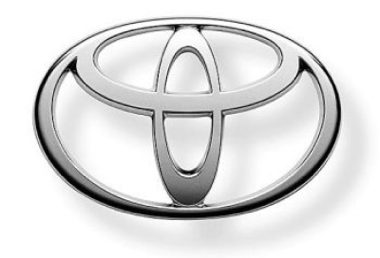
For the last couple of years, hydrogen cars have been the talk of the town. Unlike electrics, they’re so far in the future and so new that all the news about them revolves around giant advances in technology and the simple mystifying fact that someone was able to drive one around the block withot a. blowing up or b. running out of gas.
A few years ago, Honda came out with the first EPA-certified hydrogen vehicle, the FCX Clarity, and promised that hydrogen vehicles would be on sale to the public in limited quantities by 2018 (for an unannounced but likely extraordinary price). Since then Honda has begun leasing the vehicles to consumers for testing and GM has rolled out 100 test leases of their own hydrogen SUV.
However, it seems like Toyota is going to try to beat everyone to the punch by being the first to the market with their hydrogen cars. So far, Toyota only has a hydrogen version of their Highlander SUV, a relic of the SUV age to be sure, but hopefully they will be able to put their hydrogen system in a more manageable and less socially stigmatized vehicle before sale in 2015.
Is this a good step for Toyota? Being on the frontlines offering new technology to consumers is definitely something most major car manufacturers want to do, but will Toyota be wrapping up too much of its name in the success of hydrogen by investing so heavily in them? They already have plans for a purely electric vehicle based on the iQ and I can just imagine the efficiency comparisons that will abound between Toyota’s electric and hydrogen options. Now that electric is more viable in consumer opinion, shouldn’t we cut out the middle man (hydrogen)? Your thoughts are welcome in the comments
Popularity: 18% [?]




{ 12 comments }
I hope you can go really far on hydrogen, because I’ve never seen a hydrogen filling station, and it doesn’t seem like they are working on developing the infrastructure by 2015.
Toyota is reading the tea leaves and foreseeing the quick death for the carbon based economy. With global action now revving up to cap or make costly carbon fuel sources like coal and oil, alt fuels are going to start moving forward quickly. Electric vehicles are basically coal (or worse, nuke) powered vehicles today.
Hydrogen could be a good replacement for baseload power sources, if they can get the funding to work the kinks out. It promises to be a true universal fuel that can power both home and vehicle from distributed power sources, like a home hydrogen power plant.
Hydrogen is not a “middle man,” it’s a longer solution for electrics. Stop thinking of hydrogen as a “fuel” and instead think of it as an electric storage medium, which is what a fuel cell really is. Pound-for-pound, inch-for-inch, compressed hydrogen WAY outperforms any battery technology. It’s also fully renewable and non-polluting.
Where you gonna get all that hydrogen?
It is true that hydrogen is the best performing fuel in Fuel Cells. It needs less noble catalysts (platinum) and provides high power density and acceptable cell-lifetime . Hydrogen is, however, a highly explosive gas and compression, storage and transport, also liquified or stored in metalhydrides, is quite expensive and needs severe safety precautions. A distribution grid typically in a major European country will cost approx. 2 Bio. Euros which the consumer has to pay through the Hydrogen fuel price.
Because of these barriers liquid fuels like Methanol/Aethanol, that perform at lower power density are nevertheless preferred since they can take advantage of the existing distribution grids and the storage on the vehicles is much easier and less costly than for a highly explosive gas.
i wish 2 have camry 2.2 free of charge
A fool cell will never be viable for many reasons but the most important is it takes 4x’s as much energy/mile than an EV does. And cost of energy, eff will be the driver of future transport.
Ian is completely wrong as EV’s cost many times less, charge faster, 15 minutes at a fast charge station and can go as far or farther/charge. Now we buy Lithium LiFePo4 EV size batteries for around $.30/wthr which is less than a sealed lead battery.
Everyone else has dropped H2 cars except Honda because the only reason for them was to keep EV’s from becoming common, used as the excuse. But now 300 mile EV’s are viable as Li batts drop in price they can’t be ignored anymore since oil is going back up with a bullet.
As for them being coal powered, coal is dying, being replaced by NG. Last yr wind was the largest new electric energy source, beating coal, NG, nuke, hydro. But even powered by coal EV’s according to the EPA are cleaner, more eff. Many Evers buy RE to charge their rides.
My EV’s get between 250 and 600mpg cost equivalent at $2.50/gal gas. Let’s see HS or any other type beat that!! And using wind or solar I can make my own fuel if prices rise.
@ Tom the Brat
“Where you gonna get all that hydrogen?”
From WATER…aka H2O 9thatwould be TWO hydrogen atoms for every one oxygen atom).
Wow….2015 for a hydrogen car! Why is toyota even wasting their time? We will be cruising around in electric cars by then!
Thomas – stop dreaming and read what has been said above by @The electrochemist. Fuel cells using ethanol or methanol overcome the important time constraint of battery charging (5-8 hrs) and unsufficient energy density of storage batteries for long range driving. Hydrogen is electrochemically superior to these liquid fuels but the technical and cost-problems of gas storage in the car and at filling stations are tremendous. – Electric cars are fine for limited distance driving and also in Plug-in technique. Long range driving is currently and also in the foreseeable future limited by (1) high cost and weight of the battery [Li-ion], (2) the still unresolved cycling instability (lifetime) of the battery -> max 3 years with 30-50% capacity loss, (3) the potential safety / reliability problem. Enhanced R&D effforts are announced as the solution to these restrictions. But this approach is very uncertain, in particular as R&D on Li-ion batteries continue already for 25 years: many alternative anode and cathode materials + electrolytes have been investigated without that the little light at the end of the tunnel is becoming really brighter. Due to the important cycling property which requires always months to determine a possible progress, battery research is very time and cost consuming.
Moreover, there are many dreamers in that field, e.g. so called “breakthrough” published that provide L-ion batteries with 30 years lifetime or 1 minute recharging or increasing energy density by a factor of 5 to 10. They are just utopic and have NO CREDIBILITY for experienced electrochemists. The only proof is to bring at least two million cars with electric propulsion on the road. No car company has yet achieved this goal for electric cars, except the hybrid electric cars using the innovative high energy battery Titan-Nickel-Metalhydride [NiMH] which has overcome the cost (1/3 of Li-ion cost) and safety problems and in the ssecond generation reaches comparable energy density as LiFePO4. In Europe NiMH batteries for hybrids + Plug-ins get increased use by BMW (X6), Peugeot (XX), Porsche (Cayenne, Panamera) etc. COST is in automotive use still the dominating property over driving range. Toyota has shown how to do it by bringing the Prius and Lexus on the market.
so much to refute…
@The Electrochemist:
Transport? hydrogen? It can be manufactured right on site. A ‘gas station’ becomes nothing more than a solar panel, electrolysis unit and a tank. Even so, there are certainly many many things we transport around today that are just as, if not more, dangerous than hydrogen. Like, ahem, gasoline. Hydrogen is lighter than air so any spills/leaks etc simply float away into the atmosphere.
.
@jerry dycus:
The ‘cost of fuel’ as you say is significant. Given that Hydrogen can be produced with zero fuel cost, it’s pretty cheap compared to anything else right now. Solar and wind likewise. Hydrogen is not a fuel, it is the ‘battery’, or energy storage medium. Battery driven EV’s have the same costs as hydrogen cars in terms of ‘fuel’; exactly the same. The efficiency of fuel cells is relevant, but only if you compare it to how much charge your battery can carry. That’s the relevant comparison.
.
Your ‘EV’ has a significant achilles heel that a fuel cell doesn’t. Your battery *will* need to be replaced and replaced multiple times during a normal lifespan. That adds significant cost to the equation. A hydrogen car has a tank that lasts decades much like gas tanks do now (obviously different but tank storage is still a very mature tech – batteries decidedly are not).
I appreciate the work and decision taken to bring Hydrogen cars..though Electric cars is better option for increasing fuel consumption there are many issues related to it..Electric cars will become viable only when batteries are made obsolete. These batteries are made from toxic materials which again leads to pollution and too little storage abilities of batteries..In this case Hydrogen cars is great option.Hydrogen can be produced domestically from fossil fuels such as coal, nuclear power etc. and thus reducing our dependence on fuel imports. It can be produced domestically from fossil fuels such as coal, nuclear power etc. and thus reducing our dependence on fuel imports.
Comments on this entry are closed.